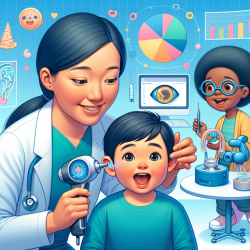Transforming Pediatric ENT Care: Insights from Recent Research
In the realm of pediatric healthcare, the ability to accurately identify, diagnose, and treat ear, nose, and throat (ENT) conditions is crucial. Recent research, such as the comprehensive study "Ear, Nose, and Throat" by Naga, Meister, and Messner, provides invaluable insights that can enhance the skills of practitioners and improve outcomes for children. This blog delves into key findings and practical applications from this research, aiming to empower practitioners with data-driven knowledge.
Understanding Common Pediatric ENT Conditions
The study highlights a variety of ENT conditions frequently encountered in pediatric settings, including otitis media, pharyngitis, and obstructive sleep apnea (OSA). Each condition presents unique challenges and requires specific diagnostic and treatment approaches. For instance, otitis media, a common ear infection, affects a significant number of children before the age of three. The research underscores the importance of timely diagnosis and appropriate antibiotic use, aligning with the 2013 American Academy of Pediatrics guidelines.
Data-Driven Approaches to Diagnosis and Treatment
Data-driven decision-making is pivotal in modern healthcare. The study emphasizes the use of evidence-based guidelines and diagnostic tools, such as pneumatic otoscopy for otitis media and polysomnography for OSA. By leveraging these tools, practitioners can ensure accurate diagnoses and tailor treatments to individual patient needs, ultimately improving health outcomes.
Enhancing Practitioner Skills through Continued Learning
While the research provides a solid foundation, it also encourages practitioners to engage in continuous learning and research. By staying updated on the latest findings and methodologies, healthcare professionals can refine their skills and adapt to evolving patient needs. This commitment to lifelong learning is essential for delivering high-quality care and achieving optimal patient outcomes.
Implementing Research Findings in Practice
To effectively implement the research findings, practitioners should consider the following strategies:
- Adopt evidence-based guidelines for diagnosing and treating common ENT conditions.
- Utilize advanced diagnostic tools to enhance accuracy and treatment efficacy.
- Engage in ongoing education and research to stay abreast of new developments.
- Collaborate with interdisciplinary teams to provide comprehensive care.
By integrating these strategies into practice, healthcare professionals can significantly improve the quality of care provided to pediatric patients.
For those interested in delving deeper into the research, the original study, "Ear, Nose, and Throat," is available for further reading. Ear, Nose, and Throat.










